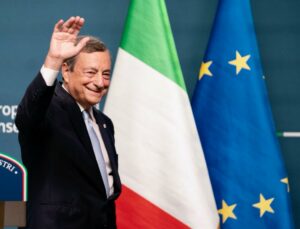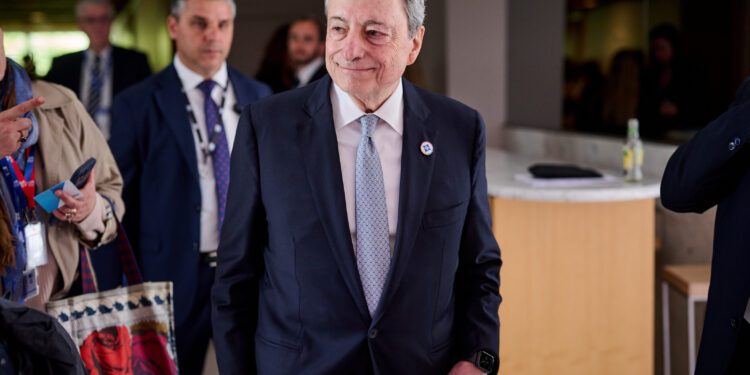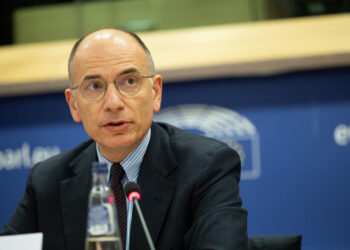Brussels – The path toward defining the priorities of European competitiveness is ready to go, with two reports to be detailed and a strategic agenda to be grounded. If the beginning of this journey is entrusted to Enrico Letta and his report on the future of the Single Market, the crossroads will come through another Italian ex-premier, Mario Draghi and his report on the future of European competitiveness. For the first time since the assignment by the President of the EU Commission, Ursula von der Leyen, it was Draghi himself who indicated the directions of his work, which sets itself not in competition but in line of continuity with the text that will be presented to the extraordinary European Council scheduled for tomorrow and the day after tomorrow (April 17-18) and which will influence the ad hoc chapter of conclusions of the EU leaders’ summit.

“For a long time, competitiveness has been a contentious issue in Europe, but the key issue is that we have the wrong focus, seeing ourselves as competitors and at the same time not looking outward enough,” began the Italian ex-premier in his speech today (April 16) at the High-Level Conference on the European Pillar of Social Rights: “We believed in the level playing field and the rules-based international order, expecting others to do the same, but the world is changing rapidly and has taken us by surprise.” In other words heavy hitters such as the United States and China “are actively devising policies to strengthen their competitive position and direct investment to their advantage and at our expense.” From Beijing that “aims to capture and internalize the entire supply chain in green and advanced technologies” to Washington that “uses large-scale industrial policies to attract high-end manufacturing capabilities within their borders.”
In contrast, the European Union “has never had an equivalent industrial pact” and especially “still lacks a comprehensive strategy for responding in multiple areas,” from chasing technology lags to protecting traditional industry “caused by asymmetries in regulation, trade, and subsidies,” to ambitions to reduce strategic dependencies (such as critical raw materials and batteries). This is where the work of Italy’s two former prime ministers comes in, culminating with Draghi presenting his report on the future of European competitiveness: “We need a European Union that is ready for today and tomorrow, what I will propose is a radical change, that’s what we need.” Faced with a changing scenario, the Union must “define priorities” through “immediate actions in the sectors with the greatest exposure to green, digital and security challenges,” is the appeal of Draghi, who provided the first previews of his report: “We focus on ten macro-sectors of the European economy, each one needs specific reforms and tools, but there are three common threads.”

Former Italian Prime Minister Mario Draghi (October 21, 2022)
First and foremost, “enabling the scalability” of European firms, equalizing “the same competitive advantage” Europe would have with major global competitors (being able to leverage continental economies of scale to drive growth, investment, and market share “where it matters most”) but held back by fragmentation. There are many examples, from defence, where “lack of scalability prevents us from developing industrial capacity,” to telecommunications, where “per capita investment is half that of the United States despite a potential market of 445 million consumers.” The second common thread is the ability to “deliver public goods” where there are “possible investments that we all benefit from, but that no country can deliver on its own.” Bottlenecks impact the Union’s strategic sectors, such as climate, defence, supercomputers, and especially energy: “An integrated energy market would ensure low energy costs for our businesses and more resilience in future crises, but we will not succeed in creating a true Energy Union unless we agree on a common approach.”
In this context, using the most appropriate instruments for investment is crucial. Draghi pointed out: “The public sector has a great role to play; we can take advantage of the great capacity to borrow on the market, but the private sector must cover the bulk of the investment.” An explicit reference to the work “to be advanced” on the Capital Markets Union, described as “an indispensable part” of the overall strategy for European competitiveness since the EU can count on “a large amount of private savings, but these often end up in bank deposits and do not help financial growth.” And finally, there is the last thread of the ten macro areas the Italian ex-premier is working on: “Securing the supply of essential resources.” A crucial priority “if we are to advance our climate ambitions without increasing dependence on countries we can no longer rely on,” particularly on critical raw materials. A comprehensive strategy “encompassing all stages of the critical raw materials supply chain” starts from the Critical Raw Materials Act presented by the EU Commission, “but we need complementary measures to make the goals more tangible” such as “a dedicated platform specifically for joint procurement.”

From left: European Council President Charles Michel and former Italian Prime Minister Mario Draghi (October 21, 2022)
In essence, the three guidelines “require us to reflect on how to organize together, in particular on what we want to do together and what we want to keep at the national level,” is the appeal of Draghi, who pointed out that “given the urgency of the challenges we face, we do not have the luxury of delaying responses to a future amendment of the Treaties.” Instead, it is of paramount importance to develop, as of now, “a new strategic instrument for economic policy coordination.” Still, if this project is not feasible by the twenty-seven countries together “, we must consider moving forward with a subgroup of member states.” In any case, the latter is not the solution favoured by Draghi because “the political cohesion of our Union requires moving forward together, possibly always.” The challenge is to restore European competitiveness; the means “is to act as a European Union in a way we have never seen before,” is Draghi’s latest message.
From the Letta report to the Draghi report
As several sources in Brussels reveal, all attention now is focused on the presentation of Letta’s report to the European Council. What will begin Thursday morning (when the discussion with the 27 heads of state and government is scheduled) is a path marked by three moments: the report on the future of the Single Market, the definition of the Strategic Agenda 2024-2029 (the central point of the European Council in June) and finally Draghi’s report on the future of European competitiveness. Sources specify that the appointment with the former governor of the European Central Bank for the presentation of the report has not yet been formalized. Still, it will nevertheless be after the June 6-9 European elections, thus at the earliest at the June 27-28 EU leaders’ summit. The complementary work between the two Italian ex-premiers is also certified by Letta’s words at today’s conference, at which he spoke a few hours after Draghi’s speech: “This is the same method I used for my report.”
According to reports in Brussels, Letta’s report is being waded through in particular because of the acknowledgement of the need to make an “enormous” amount of investment if the twin digital and green transitions goals are to be met and combined with other priorities, such as the future enlargement of the Union. There is a great deal of interest in the issue of financing that, as in the Draghi report, contemplates not only the public sphere but especially the private one, with thoughts on how to push the Capital Markets Union. In other words, everything points to a convergence of the two reports not only in the Strategic Agenda for the next legislature but especially in what will be the pillars of the next multi-year EU budget (2028-2034), given the fact that the sources report “a concrete opportunity” to create a stable floor for discussion on the goals and priorities for the long-term future of the twenty-seven, or more, countries.
English version by the Translation Service of Withub






